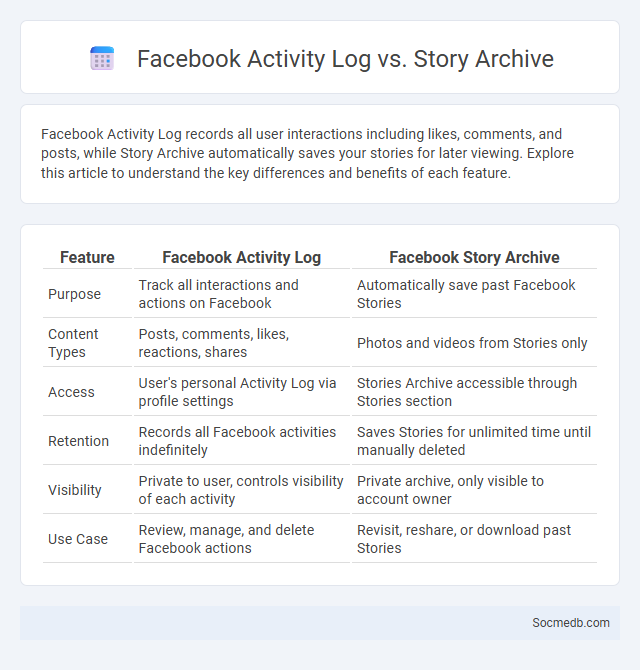
Photo illustration: Facebook Activity Log vs Story Archive
Facebook Activity Log records all user interactions including likes, comments, and posts, while Story Archive automatically saves your stories for later viewing. Explore this article to understand the key differences and benefits of each feature.
Table of Comparison
| Feature | Facebook Activity Log | Facebook Story Archive |
|---|---|---|
| Purpose | Track all interactions and actions on Facebook | Automatically save past Facebook Stories |
| Content Types | Posts, comments, likes, reactions, shares | Photos and videos from Stories only |
| Access | User's personal Activity Log via profile settings | Stories Archive accessible through Stories section |
| Retention | Records all Facebook activities indefinitely | Saves Stories for unlimited time until manually deleted |
| Visibility | Private to user, controls visibility of each activity | Private archive, only visible to account owner |
| Use Case | Review, manage, and delete Facebook actions | Revisit, reshare, or download past Stories |
Introduction to Facebook Activity Management
Facebook Activity Management allows users to control and review their interactions across the platform, enhancing privacy and data transparency. This feature helps manage ad preferences, limit data sharing with third parties, and clear off-Facebook activity linked to user accounts. By utilizing Facebook Activity Management, users can customize their online experience and improve security settings based on their activity history.
What is Facebook Activity Log?
Facebook Activity Log is a comprehensive record of your interactions on the platform, including posts, comments, likes, and shares. It allows you to review, manage, and control the visibility of your activities, ensuring your profile reflects what you want others to see. You can easily filter and delete specific actions to maintain privacy and organize your digital footprint.
Exploring the Features of Activity Log
The Activity Log on social media platforms provides a detailed record of all user interactions, including posts, comments, likes, and shares, enabling efficient management of online presence. It offers filtering options to review activities by date, content type, or audience, enhancing privacy control and content curation. Users can quickly identify and modify past actions, ensuring their digital footprint aligns with personal or professional branding strategies.
Understanding Facebook Story Archive
Facebook Story Archive automatically saves your stories after they expire, allowing users to revisit and manage past content without manually saving each story. This feature enhances content accessibility and privacy by restricting archived stories from public view, visible only to the user. Utilizing Facebook Story Archive supports efficient content organization and long-term digital memory retention within the platform.
Key Functions of Story Archive
Story Archive on social media platforms allows you to automatically save your posted Stories for future access, enabling easy retrieval and reuse. It organizes Stories by date, providing a seamless way to manage and revisit your shared content without cluttering your main profile. This feature enhances content longevity, offering valuable insights through archived interactions and engagement metrics.
Comparing Activity Log and Story Archive
The Activity Log on social media platforms provides a comprehensive record of all your interactions, including posts, likes, comments, and account settings changes, helping you monitor your digital footprint. Story Archive specifically stores your previously shared Stories, allowing you to revisit, save, or re-share ephemeral content beyond its usual 24-hour lifespan. Understanding the distinct functions of the Activity Log and Story Archive enables you to manage and optimize your content visibility and engagement efficiently.
Privacy Controls in Activity Log vs Story Archive
Your social media Privacy Controls offer distinct protections: the Activity Log enables you to review and manage interactions such as likes, comments, and posts, ensuring your timeline reflects only what you want others to see. Meanwhile, the Story Archive automatically saves your stories privately, allowing you to revisit or share past moments without them being visible to your followers. Balancing these features helps you maintain control over your digital footprint and personal content confidentiality.
How to Access and Use Each Feature
Accessing social media features requires navigating intuitive interfaces commonly available on mobile apps and desktop platforms. To post content, users can click the "Create" or "+" button, allowing photo uploads, text input, or video sharing, while interactive elements like likes, comments, and shares are accessible beneath each post. Profile customization is achieved through settings or "Edit Profile" sections, and privacy controls are managed via account settings to tailor visibility and interaction preferences.
Pros and Cons: Activity Log vs Story Archive
Social media platforms offer Activity Log and Story Archive features to enhance user experience and content management. The Activity Log provides a detailed record of user interactions such as comments, likes, and posts, enabling easy review and control over past activities, enhancing privacy and account management. In contrast, the Story Archive automatically saves posted stories for later viewing and retrieval, allowing users to preserve ephemeral content, but it can lead to clutter and raise concerns about long-term data storage and privacy.
Choosing the Right Tool for Your Facebook History
Selecting the right tool to analyze your Facebook history involves evaluating features like data export capabilities, timeline visualization, and privacy controls. Tools such as Facebook's own Activity Log, third-party apps like Social Book Post Manager, and data download options offer varied levels of detail and user-friendliness. Prioritize tools that maintain compliance with Facebook's API policies to ensure secure and accurate access to your historical interactions and posts.
 socmedb.com
socmedb.com